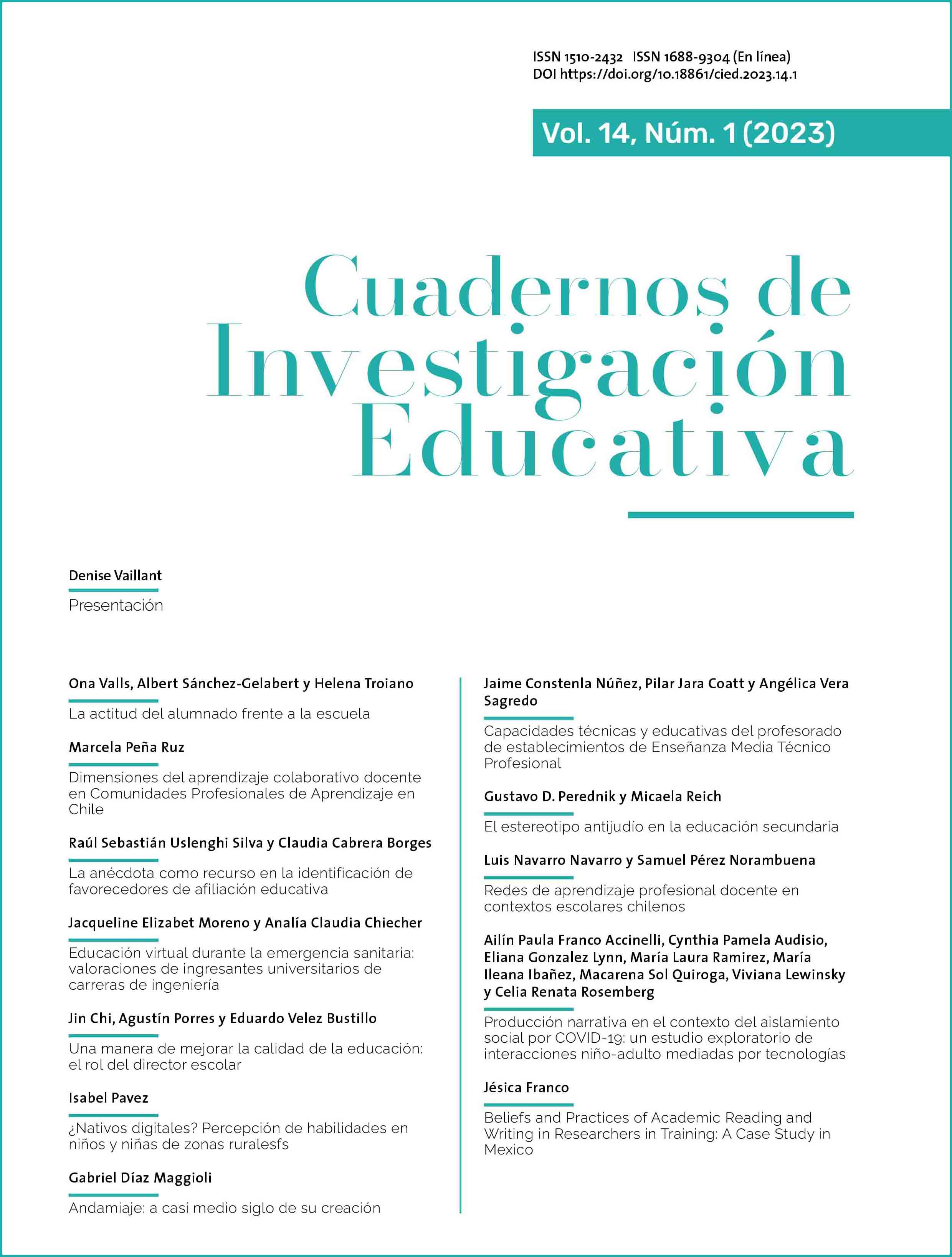Scaffolding: Almost half a century after its creation
DOI:
https://doi.org/10.18861/cied.2023.14.1.3251Keywords:
mediation, scaffolding, Zone of Proximal Development, Sociocultural perspective, meta-analysis, teaching, learningAbstract
The scaffolding metaphor was originally coined in the second half of the twentieth century to account for a very specific form of support for learning. However, since its inception in the field of education, it has been used to refer to a wide array of constructs related to teaching and learning. This research project used a meta-analysis of the literature on scaffolding since its inception in the field of education. Findings confirmed the existence of various conceptualizations of the term and made evident the need to advocate for a specific epistemological positioning for it, given its relevance to the fields of teaching and learning.
Downloads
References
Bickhard, M. (2005). Functional scaffolding and self-scaffolding. New Ideas in Psychology, 23, 166-173.
Bliss, J., Askew, M., & Macrae, S. (1996). Effective teaching and learning: Scaffolding revisited. Oxford Review of Education, 22(1), 37-61.
Botella, J. & Zamora, A. (2017). El metaanálisis: una metodología para la investigación en educación. Educación XXI 20(2), 17-38. https://doi.org/10.5944/educxx1.19030
Bruner, J., & Sherwoord, V. (1976). Peekaboo and the learning of rule structures. In J. Bruner, A. Jolly, & K. Sylva (Eds.), Play: Its role in development and evolution (pp. 277-287). Penguin Books.
Chaiklin, S. (2003). The Zone of Proximal Development in Vygotsky’s analysis of learning and instruction. In A. Kozulin, B. Gindis, V. Ageyev, & S. M. Miller (Eds.), Vygotsky’s educational theory in cultural context (pp. 39-64). Cambridge University Press.
Díaz Maggioli, G. (2013). Of metaphors and literalization: Reconceptualizing scaffolding in language teaching. Encounters/Encuentros/Rencontres on Education 14, pp. 133-150.
Díaz Maggioli, G. (2022). Initial Language Teacher Education. Routledge.
Feuerstein, R., Rand, Y., Hoffman, M., & Miller, R. (1980). Instrumental enrichment: An intervention program for cognitive modifiability. University Park Press.
Gibbons, P. (2002). Scaffolding language, scaffolding learning: Teaching Second Language Learners in the mainstream classroom. Heinemann.
Gibbons, P. (2003). Mediating language learning: Teacher interactions with ESL students in content-based classrooms. TESOL Quarterly, 37(2), 247-273.
Glass, G. V., McGraw, B., & Smith, M. L. (1981). Meta-analysis of social research. Sage.
Guba, E. G., & Lincoln, Y. S. (1994). Competing paradigms in qualitative research. In Denzin, N.K. & Lincoln, Y.S. (Eds.), Handbook of qualitative research (pp. 105 - 117). Sage Publications, Inc.
Hammond, J., & Gibbons, P. (2005). Putting scaffolding to work: The contribution of scaffolding in articulating ESL education. Prospect, 20(1), 6-30.
Holton, D., & Clarke, D. (2006). Scaffolding and metacognition. International Journal of Mathematical Education in Science and Technology, 37(2), 127-143.
Johnson, K. E. (2009). Second language teacher education: A sociocultural perspective. Routledge.
Kozulin, A. (1998). Psychological tools: A sociocultural approach to education. Harvard University Press.
León Hernández, S. R., & Aguilera Zepeda, J. M. (2001). Metodología de los estudios de metaanálisis en la investigación clínica. Revista Mexicana de Ortopedia Traumática, 15(2), 86-91.
Littleton, K. & Mercer, N. (2013). Interthinking: Putting talk to work. Routledge.
Mason, J., 2002. Researching your own practice: The discipline of noticing. Routledge.
Mercer, N. & Howe, C. (2012). Explaining the dialogic processes of teaching and learning: The value and potential of Sociocultural theory. Learning, Culture and Social Interaction, 1(1), 12-21.
Mercer, N. (2000). Words & Minds: How we use language to think together. Routledge.
Mercer, N. (2004). Sociocultural discourse analysis: Analysing talk as a social mode of thinking. Journal of Applied Linguistics, 1(2), 137-168.
Poehner, M. E. (2010). Dynamic assessment: A Vygotskian approach to understanding and promoting L2 development. Springer.
Poehner, M. E., & Lantolf, J. P. (2005). Dynamic assessment in the language classroom. Language Teaching Research, 9(3), 233-265.
Saldaña, J. (2013). The coding manual for qualitative researchers. Sage.
Sharpe, T. (2006). “Unpacking” scaffolding: Identifying discourse and multimodal strategies that support learning. Language and Education, 20(3), 211-231.
Sherin, B., Reiser, J., & Edelson, D. (2009). Scaffolding analysis: Extending the scaffolding metaphor to learning artifacts. Journal of the Learning Sciences, 13(3), 387-421.
Shrum, J. L., & Glisan, E. W. (2010). Teacher’s Handbook: Contextualized Language Instruction. Cengage Learning.
Swain, M., Kinnear, P., & Steinman, L. (2011). Sociocultural theory in second language education: An introduction through narratives. Multilingual Matters.
Vaillant, D. & Marcelo, C. (2021). Formación inicial del profesorado: Modelo actual y llaves para el cambio. REICE. Revista Iberoamericana sobre Calidad, Eficacia y Cambio en Educación, 19(4), 55-69. https://doi.org/10.15366/reice2021.19.4.003
Vélez-Ibáñez, C. G., & Greenberg, J. B. (1992). Formation and transformation of funds of knowledge. Anthropology and Education Quarterly, 23, 313-335.
Verenikina, I. (2004). From theory to practice: What does the metaphor of scaffolding mean to educators today? Outlines, 2, 5-15.
Viada González, C., Fors López, M., Ballesteros, J., Álvarez Cardona, M., Frías Blanco, A. & García Fernández, L. (2018). Metodología y sistemas para el metaanálisis de ensayos clínicos. Revista Cubana de Informática Medica, 10(2). http://www.revinformatica.sld.cu/index.php/rcim/article/view/306
Vygotsky, L. S. (1978). Mind in society: The development of higher psychological processes. Harvard University Press.
Vygotsky, L. S. (1987). The collected works of Lev S. Vygotsky. Volume I: Problems of General Psychology. Plenum Press.
Walqui, A. (2006). Scaffolding instruction for English Language Learners: A conceptual framework. International Journal of Bilingual Education and Bilingualism, 9(2), 159-180.
Walqui, A., & van Lier, L. (2010). Scaffolding the academic success of adolescent English Language Learners. WestEd.
Wood, D., Bruner, J., & Ross, G. (1976). The role of tutoring in problem solving. Journal of Child Psychology and Psychiatry, 17, 89-100.






